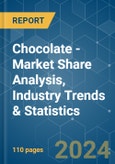The Chocolate Market size is estimated at USD 115.92 billion in 2024, and is expected to reach USD 137.88 billion by 2029, growing at a CAGR of 3.53% during the forecast period (2024-2029).
This product will be delivered within 2 business days.
Key Highlights
- The market's key factors include growing demand for organic, vegan, sugar-free, and gluten-free chocolates. With increasing awareness about the negative effects of synthetic products on health and the environment, most health-conscious and informed consumers have started using organic products. Furthermore, seasonal demand plays an important role in the sales of premium chocolates. Various companies launch a wide range of chocolate varieties during Easter, Christmas, and other occasions. Additionally, functional chocolates for health-conscious customers are gaining popularity among consumers.
- For instance, in March 2022, the 'Functional Chocolate Company' launched vegan dark chocolate along with a combination of condition-specific nutraceuticals, including vitamins, minerals, botanicals, and amino acids, to assist in addressing a variety of everyday health concerns, such as sleep, energy, stress, and attention.
- One of the trends in the chocolate market is the increase in demand for artisanal chocolates, with some companies opening their own shops and using them to promote their brands. The unique flavor of cocoa beans is emphasized as the trend moves toward quality. Fresh cocoa beans are used to make these items, which are then carved into chocolates by small-scale chocolatiers. Companies hire artisans to work with cocoa farmers to compete with other players in the market to choose the desired quality beans, which are then roasted, ground, and polished into chocolate.
Chocolate Market Trends
Increasing Demand for Single-Origin and Certified Chocolate
- The demand for fine flavour cocoa in regions like Europe and North America is experiencing substantial growth. Ultra and high-end beans are used for gourmet chocolates. Regular and low-fine beans are used for regular premium chocolates, especially in countries like the United Kingdom, Brazil, the United States, China, India, the Netherlands, Germany, and Switzerland. This development is driven by the health trend and the quest for more exclusive products. The premium cocoa market, with sustainability certification and single-origin, accelerates the market's overall growth.
- In response to the propelling demand, manufacturers are introducing their single-origin and premium chocolate line-ups. These strategies are helping brands gain more profit margins and grow with a more positive brand image. For instance, according to a news published by 'New Foundland & Labor, Canada, in 2022, the first bean-to-bar chocolate firm in Canada was born out of a tiny venture that started as an idea and involved plenty of chocolate sampling.
- Jacobean Studio Inc., a Mount Pearl, Canada, is expected to benefit from the provincial government's support as it works to improve its marketing and production operations. Jacobean creates a variety of goods using cacao from Mexico and Peru, such as inclusion bars with Newfoundland and Labrador berries and single-origin bars.
Europe Dominates the Market
- European consumers place greater emphasis on the quality of chocolates, owing to increasing health concerns involving cheaper chocolates in the region and a surge in the popularity of fine cocoa. Therefore, European consumers are willing to pay more for chocolate products that meet their demands.
- The European consumer's paradigm shift toward high-quality chocolate products (such as single-origin chocolates, organic chocolates, handmade chocolates, artisan chocolates, etc.) is a significant factor driving the chocolate market in the region. There is a tremendous demand for dark chocolates, as they have lower amounts of sugar paired with the rich bitter taste of concentrated cocoa.
- The UK market is one of the significant chocolate-consuming markets in Europe. Plain chocolate is the most popular choice. However, premium chocolates are gaining traction, with consumer preference growing toward premium dark chocolate. In addition, Britain's confectionery sales have been on the rise, with an increase in the demand for chocolate targeted toward a specific set of consumers.
- Companies also focus on developing free-from and vegan chocolates to capture the growing demand. For instance, Godessi Limited offers premium chocolates in different flavors, such as walnut and cinnamon, orange and cinnamon, peppermint, and raspberry and almonds. The chocolates are gluten-free, dairy-free, soy-free, and vegan and, thus, meet the special dietary needs of the consumers.
Chocolate Industry Overview
The chocolate market is fragmented with the presence of both regional and international players such as Mars Incorporated, Yildiz Holdings, and Ferrero International SA. The major players continuously focus on product innovation with the launch of premium chocolates worldwide. Furthermore, manufacturers in the market studied have been largely focusing on chocolates for special occasions, such as Valentine's Day, Easter, and Christmas, by offering special chocolates in different colors and shapes, matching the theme of the celebration.Additional Benefits:
- The market estimate (ME) sheet in Excel format
- 3 months of analyst support
This product will be delivered within 2 business days.
Table of Contents
1 INTRODUCTION
4 MARKET DYNAMICS
5 MARKET SEGMENTATION
6 COMPETITIVE LANDSCAPE
Companies Mentioned (Partial List)
A selection of companies mentioned in this report includes, but is not limited to:
- Mars Incorporated
- Ferrero International SA
- Mondalez International
- The Hershey Company
- Nestle SA
- Yildiz Holding
- Chocoladenfabriken Lindt & Sprungli AG
- Grupo Arcor
- Meiji Holdings Co. Ltd
- Lake Champlain Chocolates
Methodology

LOADING...










